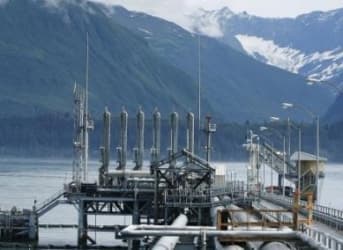The U.S. Congress is nearing final approval of a bill that would green light the Keystone XL pipeline. But with the President set to veto the legislation when it reaches his desk, the ability of companies in Alberta to get their tar sands oil out of the country looks highly uncertain.
With a southern route through Keystone XL potentially blocked, there have been alternative routes east and west. Enbridge has proposed the Northern Gateway pipeline, which would travel to British Columbia’s Pacific coast, but that has faced stiff environmental opposition from provincial residents and indigenous groups. TransCanada is also pushing its Energy East project, a 4,600-kilometer pipeline that would take 1.1 million barrels of tar sands from Alberta to the Atlantic coast. That too has faced regulatory hurdles and strong environmental opposition, putting its ultimate fate in doubt.
What is a tar sands producer to do when routes east, west, and south have all run into a brick wall of opposition? Go north. Or, more specifically, northwest. Bloomberg reported that the province of Alberta is considering a pipeline that would run from the major tar sands projects in Alberta, and travel through the U.S. state of Alaska to the coast. The pipeline would have to be constructed through the Canada’s Northwest Territories and Yukon, reaching ports on the Pacific coast in Alaska. Related: Why The World Needs Both Shale And Tar Sands
The advantage that this northwestern tar sands route would have over the stalled alternatives is that it would be constructed in a much more politically favorable environment. It would not run into the political buzz saw that pipeline companies have found in the U.S., British Columbia, and Ontario.
The governments in Alberta, the Northwest Territories, Yukon, and Alaska are all supportive of the expansion of the Athabasca tar sands. Governor Bill Walker, “welcomes all constructive dialogue on growing Alaska’s economy, and looks forward to sharing experiences with another world-class energy-producing region,” a spokeswoman for the Alaskan governor confirmed.
On the other hand, a tar sands pipeline running through such harsh terrain in Canada’s northwest and Alaska could certainly face significantly higher costs. In fact, it is not at all clear that such a route even makes economic sense. “It’s technically feasible,” Alberta Premier Jim Prentice told Bloomberg in an interview. “Whether it’s economically feasible has yet to be determined, so we’re working on that.”
Separately, a Canadian rail company is proposing a $15 billion rail project that would open the door to moving tar sands by rail to Alaska. The rail project would connect Fort McMurray, a major hub for tar sands production, to Delta Junction, Alaska, where it could link up to the Trans-Alaskan Pipeline System (TAPS). The proposal calls for moving over 1 million barrels of oil a day, a rail project of unprecedented size and scope. To move oil at that rate, “it would require unloading 200 freight trains every 45 minutes,” according to the AP. Related: Keystone XL Pipeline: Why The Big Fuss?
Still, it is far from clear whether the rail project is feasible economically or even technically. A state representative from Alaska voiced some concerns after listening to a presentation of the project. “I don’t know if anybody in that study has talked to the owners of the Trans-Alaska Pipeline. They would obviously have a great deal to say about what gets put into their pipeline,” Rep. Eric Feige (R-Chickaloon) said. “… A million barrels of bitumen a day will not go into TAPS. Technically, you don’t have the capability to do that.”
As an alternative, Feige recommended building the railway to the port of Valdez, home to one of the worst environmental disasters in U.S. history. Otherwise, if the rail company wants to link up to TAPS, the sticky, heavy tar sands oil would need to be refined first, Feige said.
A massive pipeline or a railway crisscrossing northern Canada and Alaska underscores the quandary that tar sands producers find themselves in. Producers lack adequate access to market, which is currently constraining their ambitious long-term production plans. The northwest route raises enormous environmental, economic, and safety-related questions. But given the fact that all of their other routes have been blocked, tar sands producers are running out of other options.
ADVERTISEMENT
By Nick Cunningham of Oilprice.com
More Top Reads From Oilprice.com:
- Alberta One Of Hardest Hit By Lower Oil Prices
- Oil Price Collapse Hurting Some More Than Others
- British Columbia Bars LNG Pipelines From Carrying Oil Sands


















Bad things can happen.
Valdez and in the gulf and the owners responded to each accident above and beyond what is needed.
Oil is a resource that mankind needs to create a livable environment for people around the world not only in the US or Canada. A fact that everyone does not want to admit.
That is lot more to say
I didn't see any apparent demand for fossil fuel for the comming years